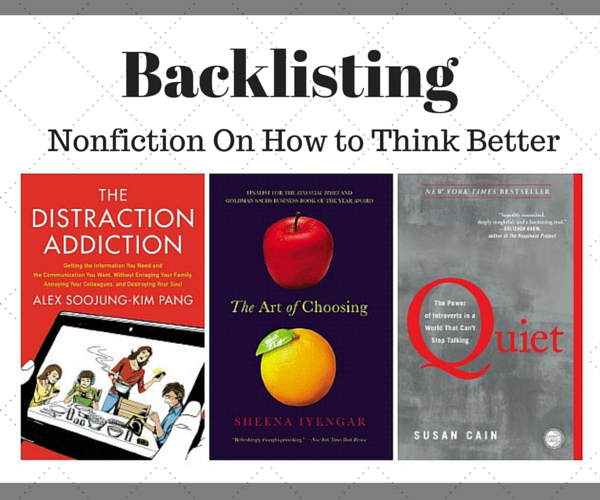
As I was working on my review of Presence by Amy Cuddy, I started thinking about some of the other really great psychology books I’ve read in the last few years that I don’t think got enough attention. It gave me the idea for a new, semi-regular feature looking at some books I recommended highly when I first reviewed them that are out in paperback now – sort of a backlist bump for some great titles I think you’ll enjoy.
The theme of this first trio is psychology, specifically three books that get at different ways of thinking that I’ve found myself referencing frequently since I first read them:
The Distraction Addiction by Alex Soojung-Kim Pang (My Review) – This book is all about how we can stay connected using technology without “without diminishing our intelligence, attention spans, and ability to really live.” Pang uses a metaphor of the “monkey mind” to talk about how technology affects us and encourages a practice of “contemplative computing.” Most of what is in the book isn’t new, but it was packaged in a way that resonated with me and resulted in making a couple substantive changes to how I related to my devices. (Note: Despite the fact that it was published in 2013, this one is still only in hardcover… that’s super annoying!)
The Art of Choosing by Sheena Iyengar (My Review) – I probably reference anecdotes from this book more often than just about any other piece of nonfiction I’ve read since I started blogging. Iyengar, a business professor at Columbia Business School, studies choices: how we go about making choices and what the consequences of those choices can be. She’s done some fascinating studies about what happens when we have an overabundance of choices and whether that ultimately makes us unhappier. Plus, Iyengar has a lovely, dorky sense of humor that I found really enjoyable to read.
Quiet: The Power of Introverts in a World That Can’t Stop Talking by Susan Cain (My Review) – Whenever I take the Myers-Briggs Personality Test, I am an off-the-chart introvert. But this fact tends to surprise people who don’t know me well because, for the most part, I’m pretty friendly and decent in social situations. It wasn’t until I read Quiet that I found a vocabulary for introversion/extroversion that made sense to me and that I could articulate to others, based a lot on what types of interactions and work styles energize introverts versus extroverts. This is another one that I’ve recommended quite a bit to others and referenced often when talking about personality.
What are some of your favorite books on how we think and how we can think better?

Comments on this entry are closed.
I have almost certainly mentioned this to you before, but have you read Daniel Kahneman’s book Thinking Fast and Slow? It’s really, really good — he’s one of the pioneers of studying cognitive biases, and the book is about all those biases and how our brains use them. Super fascinating.
I own it, but I haven’t read it yet! Thanks for the recommendation, I’ll have to move it up on my TBR.
The Distraction Addiction sounds good, and like it’s a lot more balanced than other books I’ve read on that topic. Hardcover only, though, ugh. Maybe my library will have a copy. 🙂
I thought it was really balanced. He doesn’t suggest getting rid of devices or that technology is terrible, just ways that we can use it more mindfully.
I really need to read Quiet – I know where I stand as far as being an introvert but I would love to learn more about living with it.
I lot of what she talks about is where introverts and extroverts gain energy, which made a lot of sense to me. Introverts don’t dislike people, we just need alone time to recharge in those situations.
I am like you in the fact that I know I’m an extreme introvert, but most people I know professionally and as acquaintances would be shocked by that, so reading Quiet was an incredible experience for me. It validated a lot of what I already suspected about myself and definitely made me feel less alone in my introversion. The other two you mentioned here sound great and really worth checking out. Thanks for the recommendations!
Yes, that’s what I felt about Quiet too! It helped make sense of a lot of the things I felt about myself.
I seriously adore “The Power of Habit” by Charles Duhigg. He provides fascinating anecdotes to illustrate various aspects of how we form habits. Conversational, intriguing, inspiring.
I adored QUIET. It was the first time I felt it was cool to be an introvert.
I love this feature! I really enjoy reading and creating themed list posts and I’ve been thinking about doing some more on Riffle myself 🙂
I love book lists. They are my favorite thing!